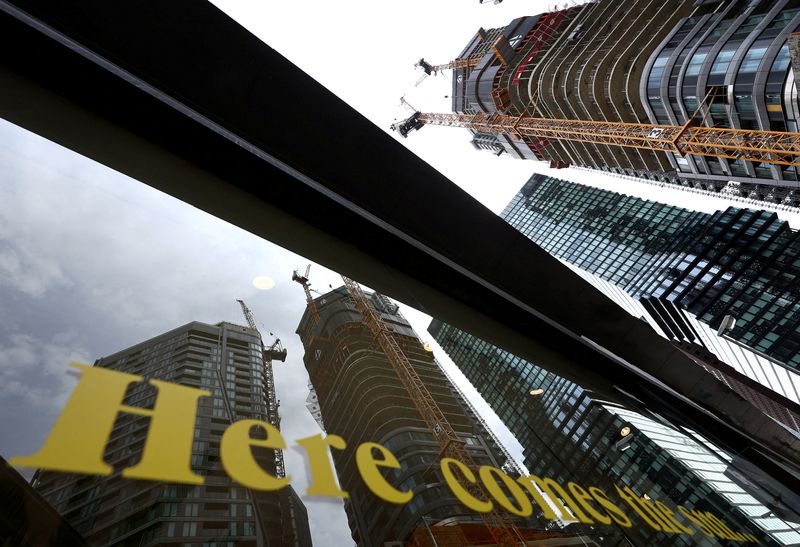By Tom Sims and John O'Donnell
FRANKFURT (Reuters) - International investors are skirting German property deals as they dial back on a market in its worst crisis in a generation, potentially deepening the scars on Europe's biggest economy.
Foreign buyers accounted for 35% of purchases of commercial real estate in the first quarter, data from BNP Paribas (OTC:BNPQY) Real Estate shows. That is less than in any year since 2013 and comes against the backdrop of a 70% plunge in sales volumes from levels before the 2020-2021 pandemic.
The grim figures coincide with a debate about whether Germany is once again "the sick man of Europe" - a label it was given in late 1990s as it struggled with economic stagnation and high unemployment. The nation worked years to shake that label off, but it has re-emerged as Germany weans itself off Russian energy, gets tangled in bureaucracy and sees far-right politicians gaining in the polls.
Kurt Zech, one of Germany's biggest developers, warns the market will keep struggling until foreign investors return.
"The Americans have to come back. When the Blackstones, the Blackrocks, the Morgan Stanley's of this world and Carlyle and Apollo buy in the German market, that will be noticed and then we will all know that we have now reached the bottom," Zech told Reuters in an interview, speaking from his headquarters in the northern city of Bremen.
For years, low interest rates, cheap energy and a strong economy sustained a boom across the German property sector, which broadly contributes 730 billion euro ($793.51 billion) a year to the nation's economy, or roughly a fifth of Germany's output.
That boom ended when rampant inflation forced the European Central Bank to swiftly raise borrowing costs. Real-estate financing dried up, deals fizzled, projects stalled, major developers went bust, and some banks teetered. The industry called on Berlin to intervene.
Commercial property prices tumbled another 9.6% in the first three months of 2024 compared with a year earlier after a 10.2% drop for 2023 - according to the VDP banking association, predicting more pain ahead.
"Germany was a beacon of stability in Europe and people flocked to buy property here," said Carsten Brzeski, chief economist of Dutch bank ING in Germany, one of the country's biggest mortgage lenders.
"Now, the economic engine is stuttering and needs maintenance. It's no longer the shiny new thing investors want."
Foreign investors accounted for 37% of transaction volumes in German commercial property in 2023, the lowest reading of the past decade, according BNP Paribas. It slipped further to 35% in the first quarter.
There were years when foreigners accounted for half of all the deals for commercial property, which makes up the bulk of Germany's property market and eclipses residential sales.
While high interest rates have weighed on property markets globally, the takeaway from the annual gathering of the sector's global elite in Cannes, France, in March was that Germany was hit especially hard.
"Where the mood is really at its worst is Germany," Simone Pozzato, a managing director and fund manager at Hines, said in an interview there.
Another executive at a European developer, who declined to be named, said it planned to redeploy staff from Germany to markets such as Britain where investor interest was stronger and where activity was expected to recover sooner.
High energy costs, weak global demand, a disruptive shift towards net-zero economies, and growing competition from China are raising questions about Germany's economic model. Some executives say the nation's historically strong industrial base is close to cracking.
The German Council of Economic Experts last week cut its forecasts, predicting the economy will barely grow this year, while Chancellor Olaf Scholz spoke of "unprecedented challenges".
Some features of the German property market also make it a harder sell.
Germany rebuilt itself from the rubble of World War Two with a decentralized design without a single dominating city. That can be a turn-off for foreign buyers who tend to target truly global centres, such as London or Paris.
"It's ... easier to understand how those cities tick. It's easier than understanding Cologne," said Inga Schwarz, head of research at BNP Paribas Real Estate.
Another hurdle: German landlords typically try to ride out downturns without slashing property prices, deterring potential buyers and delaying a pickup in transactions needed to revive the market.
"International market participants criticize that in Germany large property holders have only devalued by a few percentage points in some cases, while other countries devalued 20% to 30%," said Hela Hinrichs, senior research analyst with Jones Lang LaSalle.
Those few deals around are often being made under duress. Signa, the property conglomerate that went bust, has been shedding assets to pay off creditors, and the landlord Vonovia has been selling apartments to pare down debt.
"If you look deeper into many of the deals, you'll see that they have their peculiarities," said Marcus Cieleback, head of research at the German property asset manager Patrizia. "Is this really a free market transaction or is it possibly something else?"
Meanwhile, Zech, the property tycoon whose name is on construction sites throughout Germany, is calling on banks to keep the money flowing to the industry so that projects can be completed, and said he hopes the market starts to turn around this year.

To potential foreign buyers, he says: "My message is that there are currently some good projects in Germany."
($1 = 0.9200 euros)